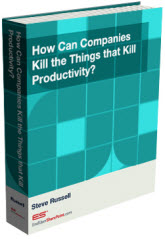SharePoint Knowledge Management – A Simplified Academic View – Part 1
 Guest Author: Adam Buenz
Guest Author: Adam Buenz
ARB Security Solutions
Knowledge has always been something that makes the economy around the world better. There is plenty of competition out there and the fact that more than 81% of all the organizations around the USA and Europe continue to look for more effective ways to manage all the various aspects of their businesses has a great deal to do with that. They are all in agreement that without effective management in place the business isn’t going to be as competitive as it should be.
It doesn’t matter what type of business you are talking about or even how large it happens to be. When it comes to the creation of goods, services, or even physical labor and production this is an element that deserves to get plenty of recognition. In fact, there are many experts out there as well as scholars that continue to do research on this very topic. They want to find out how a business is able to really benefit from such information.
They are also able to take that information and analyze it. From there they are able to come up with some wonderful ideas about the challenges that can take place within the human resources department. Finding effective solutions is what allows all types of businesses to continue learning, benefiting, and growing both on an internal and external level.
How does this type of knowledge help the different types of structures that take place within a given organization? You have to take into consideration both the boundaries that are found in a given organization and that extend outward from it. With a knowledge based economy in mind, the structure of any business out there has to learn to balance making as much money as possible with expanding their knowledge. In most instances, they need the right information in order to make money that is profit.
While this type of overall goal may sound easy enough in theory, there are plenty of barriers that can prevent it all from taking place. The fact that there isn’t a common language in place to use when you are talking about a global economy is the largest one. Keep in mind that every culture out there has its own forms of knowledge that can give them tunnel vision from time to time.
I feel it is justified to dedicate the beginning of this information to the background of knowledge as a whole. I will be covering what the term actually means, how management fits in with it, and how it works within any type of business. Then I will go over the methods that any organization can use to move in the right direction when it comes to adding knowledge. This discussion will cover both formal and informal organizations that exist out there.
In the last section of information I will be covering the concepts that for a knowledge based economy to really thrive there is a need for a common language application to be implemented, even for those that don’t have an expanded level of ability when it comes to the cognitive end of things. Finally, I would like to discuss how knowledge assimilation is going to affect these cultures over time.
The concept of knowledge and discussing the role it plays isn’t new. In fact, many of the historical scholars including Plato and Popper have been noted to explore it as well. That certainly doesn’t mean we have concrete answers though. In fact, the debate has gone on for centuries. The philosophies of one man can be very different than that of another when it comes to the subject of knowledge.
Even though there are many directions this subject can take, there are some common aspects of it that seem to be shining through. These themes tend to be at the core of discussions that are involved when discussing knowledge and how it affects different organizations out there. For example there is the topics of clearly defining what is information and what is knowledge. There is a big difference between data which gives you facts and data that is open to interpretation. Then there is also the knowledge that is the result of human activities to explore as well.
Most experts believe that information and data are two separate types of knowledge. Tacit knowledge is the time that comes from human activities as well as life experiences. However, many disagree about the aspects of tacit knowledge. Can it be converted into other forms? Some believe that it is very personal so it is hard to transfer from one person to another.
However, there are many people who believe most of us can’t really comprehend tacit knowledge. It is too deep for us to fully take in. Regardless of which side of the debate someone is on though it all comes down to knowledge being a driving force. When it comes to any business out there, it is something that needs to be in place if they want to have a significant advantage over their competition.
How you feel about these issues really depends on the exposure you have had to it as well as your own perspective. As you explore these issues on your own as well as with others, you will quickly come to discover why scholars today continue to debate about them.
 Guest Author: Adam Buenz
Guest Author: Adam Buenz
ARB Security Solutions
Adam Buenz has been involved with SharePoint since it’s Tahoe days across a multitude of projects mainly within the government, health care, and finance spheres. Before the release of .NET he mainly programmed against the ATL/MFC framework. He is currently contracted at CENTAF (9th Air Force /US Central Command) at Shaw Air Force Base, previously contracted at the 328th Armament Systems Division at Eglin Air Force Base, working on a long term MOSS project.
In his free time, Adam is an avid muscle car fanatic and enjoys fishing and hunting.








 on
on
Where are the remaining parts?
The other parts would be nice to see.
Are the other parts going to be published? The one article by itself appears to be incomplete.
Please post the rest! TIA!
Agree with the rest of the folks, post the rest of the series. Posting one is kinda lame.